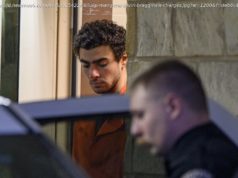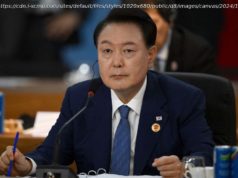While Ian D. Long may have suffered from PTSD, no evidence has been made public that it was ever diagnosed or that he was treated.
In the search for answers after a shooting that left 12 people dead at the Borderline Bar & Grill in Thousand Oaks, Calif., much attention has been focused on the gunman’s time in the Marine Corps, wondering if post-traumatic stress disorder from combat in Afghanistan left him primed to kill.
Dominique Colell says that’s a mistake.
She was a track coach at Newbury Park High School when Ian D. Long, whom authorities identified as the gunman, was a senior on the team. Even then, years before he deployed to Afghanistan, she said, Mr. Long was defiant and angry and eventually assaulted her on the track.
“This shouldn’t be blamed on PTSD. He was disturbed long before that,” she said Friday. “The military may have provided some training, but he had a propensity to violence before he ever joined.”
While law enforcement authorities and some who knew him have speculated that Mr. Long, 28, who deployed to Afghanistan in 2010, may have suffered from PTSD, no evidence has been made public that it was ever diagnosed or that he was treated. President Trump joined the chorus on Friday, calling the gunman a “sick puppy.”
But the closest veterans hospital, in Los Angeles, said he was not a patient.
Often in the chaos after a mass shooting, as news outlets scramble to pull information from investigators and families, military service is one of the few pieces of biography that can be quickly confirmed. That can be a jumping-off point for what veterans sometimes call a “Rambo narrative” — a caricature of the veteran as a ticking time bomb.
In comments to reporters at the White House on Friday, Mr. Trump fed the narrative.
“He was a Marine, he was in the war, he served time, he saw some pretty bad things,” Mr. Trump said. “And a lot of people say he had PTSD and it’s a tough deal.”
Marines who served with him, though, said they saw little combat .
Before Mr. Long was a Marine, Ms. Colell said, he stood out as angry and aggressive. A sprinter, he first came to her attention when she caught him using profanity in practice and told him to run a mile as penance.
“It was a standard punishment,” she said in an interview. “Lots of my students did their mile and I never had a problem with them again.”
Two laps into the mile, she said, Mr. Long purposefully swore at her. She added another mile. During his second mile, he swore at her again. And in his third. And his fourth.
“He ended up running 13 miles,” she said. “The students I coached were just floored that someone was so disrespectful.”
About a month later her problems with Mr. Long turned physical, she said. She had found a phone on the track and was trying to find the student it belonged to when Mr. Long ran up, yelling that it was his.
When Ms. Colell, who was 28 at the time, did not turn over the phone, she said Mr. Long grabbed her, reaching around her and grabbing her waist and buttocks.
“He was pretending to go for the phone, but really he was going for my body parts,” she said.
She said she pushed him away and immediately kicked him off the track team. She then reported the assault to the school administration, but, she said, a few days later Mr. Long appeared with flowers and apologized. Other coaches and teachers who accompanied him implored her to let him back on the team, saying that kicking him off could jeopardize his plans to join the Marine Corps.
For the rest of the season, she said, things remained tense.
“Every day after that he would come up at practice and say, ‘Here I am coach,’ like he was rubbing it in my face,” she said.
Ms. Colell, whose niece was at the Borderline bar on Wednesday when the shooting erupted, and escaped unharmed, said she was not surprised when she saw Mr. Long named as the gunman.
“He was violent then,” she said. “I coached hundreds of other students, and the only time anyone else touched me was to give me a hug.”






